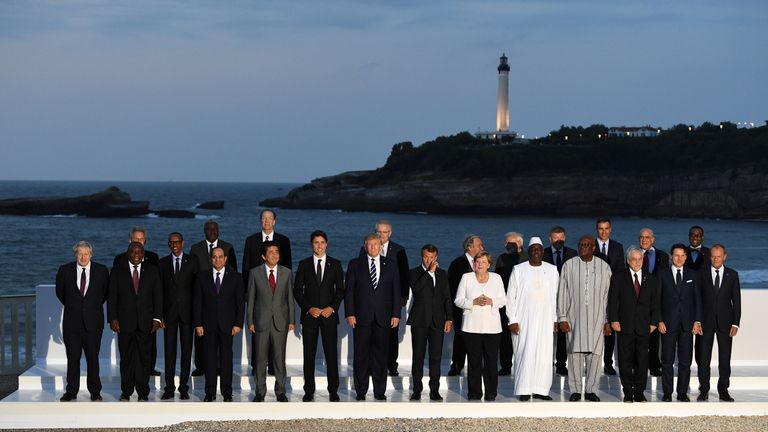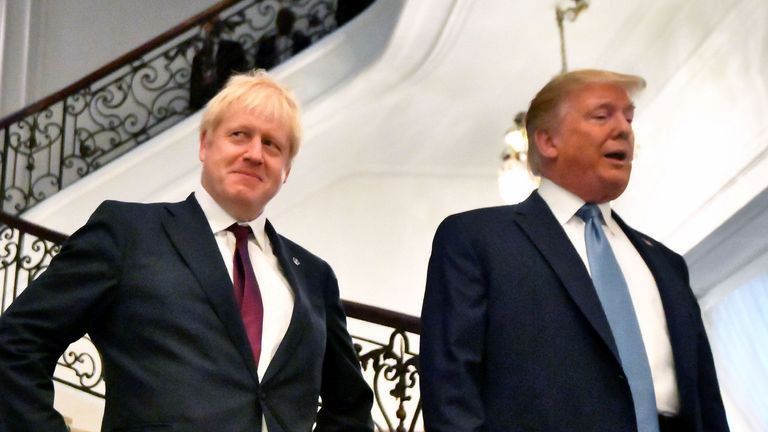Why can’t PM give a proper answer on no-deal? Because he doesn’t know
Remember when Boris Johnson said the odds for a no-deal Brexit were “a million to one”?
When I asked the prime minister in Biarritz whether he still stood by that pledge, the odds had shortened. He told me there was now a “reasonable chance” the UK will get a deal and the chances of an agreement “are improving” following meetings with his German and French counterparts this week. A few minutes later he told another journalist it was “touch and go” whether the UK will leave without a deal.
So what is it? A million to one, a reasonable chance or touch and go? It might all sound rather muddled but in truth this is a prime minister who can’t give a definitive answer because he doesn’t really know.
Mr Johnson won the referendum campaign on pledging to “take back control” from the EU, but when it comes to negotiating Brexit and a possible no-deal exit, he isn’t in control. Much of what happens depends on what the EU decides to do, and how businesses and consumers react to an abrupt exit from a trading bloc we’ve been a member of for more than four decades.
Since becoming prime minister just over a month ago, Mr Johnson has been crystal clear about his demands.
First, as he told me in our interview on Sunday, there needed to be a “great deal of realism on the part of our friends that the withdrawal agreement is dead” and the backstop has to go. “That point, I think, has now landed with our friends and what we’re hoping is that they’ll see a way forward,” he said.
Second, he confirmed that he will withhold a big chunk of the £39bn divorce bill – he wouldn’t give a figure but suggestions are he’ll keep back £30bn – if the two sides fail to reach a deal.
He said: “I think what the entire European Union understands is that if we come out without a deal, the £39bn is not pledged.
“We will therefore on 1 November have very substantial sums from that £39bn to spend on supporting our farmers… for investment in all sorts of areas that are important to our people.”
And third, if we leave with no deal, the fault will lie entirely with the EU and not with him. “The people who are going to be responsible for no-deal are not in the UK, we don’t want no-deal.”
The prime minister is clear on what he wants and what he can control, but there is plenty in all of this which he can’t, and that’s why he can’t offer any of us reassurances on what a no-deal exit might look like.
Can he promise there won’t be food shortages? They are highly unlikely but he can’t quite rule it out. “What I can tell people, and as I said a few weeks ago on the steps of Downing Street, I think we can get through this,” he said. “This is a great, great country, the UK, we can easily cope with a no-deal scenario. And I know that’s what people want.”
Bumps on the road, then, but Mr Johnson believes the British people are backing him and he is making “every possible preparation” so that “if and when we are forced to by the obduracy of our European friends to come out on 31 October without a deal, that things are as smooth as they can possible be… so I’m full of confidence about it.”
And confidence is what Mr Johnson has exuded at this summit. A prime minister with a very different style to Theresa May, he has bounded around official engagements and bi-laterals with unbridled enthusiasm and energy.
With Mr Trump there is a clear meeting of minds between two men who are as keen on Brexit as they are on each other. The pair leave Biarritz with the wheels of the special relationship well and truly oiled. There are plans for a “very big trade deal” to be accelerated in the coming months.
But by far the more pressing deal to be done is the one on Mr Johnson’s doorstep: a Brexit deal with the EU.
The two sides now have just 67 days to strike a deal. And all the back-slapping and handshaking in the world cannot disguise the deep divisions between the two factions. The cordiality shown this weekend is yet to translate into anything approaching a revised Brexit deal.
At home, Mr Johnson will be stepping up no-deal planning and launching a campaign telling us how we need to get ready for a no-deal Brexit. In Brussels, he will need to present the EU with viable alternative arrangements that will remove the need for the Irish backstop.
Mr Johnson stressed at the beginning of his meeting with Mr Tusk on Monday that the UK was leaving the EU, not leaving Europe. But the manner of his departure could deeply test those ties and that friendship. He has opened the door to a re-negotiation. Now he has to come up with a serious plan if he wants to leave on good terms and without disruption.
Source: Read Full Article




